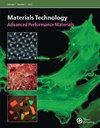Ultrasonic Nano emulsification of Apricot Kernel Oil and Its Therapeutics Effects on Suppression of Human Lung Cancer Cells (A549)
IF 3.7
4区 材料科学
Q3 MATERIALS SCIENCE, MULTIDISCIPLINARY
引用次数: 1
Abstract
ABSTRACT This study was conducted with the aim of synthesising nanoemulsion of apricot kernel oil (AKO-NE) and evaluating its cytotoxic, pro-apoptotic, antioxidant and anti-angiogenic effects. The AKO-NE was synthesised by ultrasound (150 watt for 2 min) using a combination of Tween 20 and 80 as surfactant and ethylene glycol as co surfactant. Antioxidant capacity (ABTS, DPPH scavenging free radicals) and toxicity of AKO-NE (MTT assay) and its effects on the process of apoptosis (Flow cytometry and qPCR for BCL-2, Caspase 3, 7, 9) were evaluated by specialised methods. Then, the effect of AKO-NE on angiogenesis was measured by CAM and qPCR (VEGF and VEGFR) methods. The AKO-NE showed acceptable antioxidant power and selective toxicity effects against lung cancer cells (162.7 µl/mL). The pro-apoptotic effects of AKO-NE were confirmed by increasing the number of SubG1 phase cells in flow cytometry and increasing the expression of Cas-3, 7 and 9 genes and decreasing the expression of BCL-2 gene in qPCR method. Decreased vascular and foetal growth factors in the CAM model as well as decreased expression of VEGF and VEGF-R genes in AKO-NE-treated cells confirmed the inhibitory effects of AKO-NE on angiogenesis. Inhibitory effects of AKO-NE on the growth and proliferation of A549 cancer cells and induction of apoptosis, as well as its effects on reducing angiogenesis, can suggest this nanoemulsion as a useful combination in cancer therapy.超声纳米乳化杏仁油及其对人肺癌细胞的抑制作用
摘要:本研究旨在合成杏仁油纳米乳(AKO-NE),并评价其细胞毒、促凋亡、抗氧化和抗血管生成作用。以Tween 20和80作为表面活性剂,乙二醇作为co表面活性剂,通过超声波(150瓦,2分钟)合成了aco - ne。通过专门的方法评估AKO-NE的抗氧化能力(ABTS, DPPH清除自由基)和毒性(MTT法)及其对凋亡过程的影响(流式细胞术和qPCR检测BCL-2, Caspase 3, 7, 9)。然后,采用CAM和qPCR (VEGF和VEGFR)方法检测AKO-NE对血管生成的影响。AKO-NE对肺癌细胞具有良好的抗氧化能力和选择性毒性作用(162.7µl/mL)。通过流式细胞术检测增加SubG1期细胞数量,qPCR检测增加cas3、7、9基因表达,降低BCL-2基因表达,证实了AKO-NE的促凋亡作用。CAM模型中血管和胎儿生长因子的减少以及AKO-NE处理细胞中VEGF和VEGF- r基因的表达减少证实了AKO-NE对血管生成的抑制作用。AKO-NE对A549癌细胞的生长增殖和诱导凋亡的抑制作用,以及其减少血管生成的作用,表明该纳米乳是一种有效的癌症治疗组合。
本文章由计算机程序翻译,如有差异,请以英文原文为准。
求助全文
约1分钟内获得全文
求助全文
来源期刊

Materials Technology
工程技术-材料科学:综合
CiteScore
6.00
自引率
9.70%
发文量
105
审稿时长
8.7 months
期刊介绍:
Materials Technology: Advanced Performance Materials provides an international medium for the communication of progress in the field of functional materials (advanced materials in which composition, structure and surface are functionalised to confer specific, applications-oriented properties). The focus is on materials for biomedical, electronic, photonic and energy applications. Contributions should address the physical, chemical, or engineering sciences that underpin the design and application of these materials. The scientific and engineering aspects may include processing and structural characterisation from the micro- to nanoscale to achieve specific functionality.
 求助内容:
求助内容: 应助结果提醒方式:
应助结果提醒方式:


